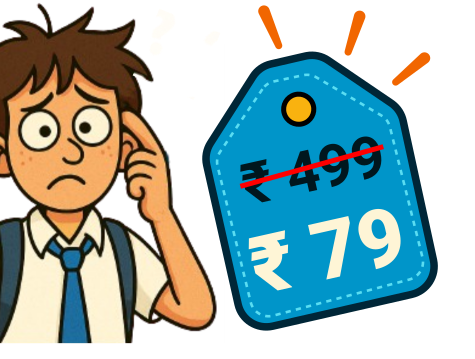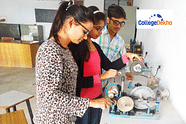-
Importance of safety and general precautions observed in the industry/shop floor.
-
All necessary guidance is to be provided to the newcomers to become familiar with the workings of the Industrial Training Institute system including store procedures.
-
Soft Skills: its importance and Job area after completion of training.
-
Introduction of First Aid.
-
Introduction of PPEs.
-
Introduction to the 5S concept& its application.
-
Response to emergencies e.g.: power failure, fire alarm, etc.
| -
Familiarisation & information about the rules and regulations of the Institute and Trade.
-
Overview of the subjects to be taught for each semester.
-
List of the Instruments, types of equipment, and materials to
-
be used during training.
| -
Importance of B.I.S.
-
Introduction of Code for Practice of Architectural and Building Drawings (IS: 962- 1989, SP-46:2003).
-
Layout of drawing. Lines, Lettering, Dimensioning.
|
-
Knowledge of different types of scale.
-
Principle of R.F.
-
Construction Materials:-
-
Stones: characteristics, types & uses.
-
Bricks – Manufacturing, characteristics of good bricks, types, uses, and hollow bricks.
-
Lime– characteristics, types, manufacturing & its uses.
-
Pozzolanic:- characteristics, types & uses.
-
Cement:– Manufacturing,
-
characteristics, types, uses, and tests of good cement.
| -
Different types of projection
-
views: Orthographic, Isometric, Oblique, and Perspective.
| -
Building materials:-
-
Sand:-characteristics, types & uses.
-
Clay Products:– types, earthenware, stoneware, porcelain, terracotta, glazing.
-
Mortar&Concrete:–
-
Types, uses, preparation,
-
proportion, admixtures, and applications.
|
-
Building materials:-
-
Timber:- Types, Structure, disease & defects, characteristics, seasoning, preservation, and utility.
-
An alternative material to Timber
-
Plywood, Block board, Particle board, Fireproof reinforced plastic(FRP), Medium density fireboard (MDF), etc.
-
Tar, bitumen, asphalt:-
-
Properties, application, and uses.
| -
Materials:-
-
Stones:– characteristics, types & uses.
-
Bricks – Manufacturing, characteristics of good bricks, types, uses, and hollow bricks.
-
Lime– characteristics, types, manufacturing & its uses.
-
Pozzolanic:- characteristics, types & uses.
-
Cement:– Manufacturing, characteristics, types, uses, and tests of good cement.
-
Building materials
|
Sand: characteristics, types & uses.
-
Clay Products:– types, earthenware, stoneware, porcelain, terracotta, glazing.
-
Mortar & Concrete:– Types, uses, preparation, proportion, admixtures, and applications.
-
Building materials:-
-
Timber:- Types, Structure, disease & defects, characteristics, seasoning, preservation, and utility.
-
An alternative material to Timber
-
Plywood, Block board, Particle board, Fireproof reinforced plastic(FRP), Medium density fireboard (MDF), etc.
-
Tar, bitumen, asphalt:-
-
Properties, application, and uses.
|
-
Building Construction:-
-
Foundation:-
-
Purpose of foundation
-
Causes of failure of foundation
-
Bearing capacity of soils
-
Dead and live loads
-
Examination of ground
-
Types of foundation – (Spread Footing, Grillage foundation, Pile foundation, Raft foundation, Well foundation, Special foundation)
-
Drawing of footing foundation setting out of building on ground excavation
-
Simple machine foundation
| -
Building Construction:-
-
The sequence of construction of a building.
-
Name of different parts of the building.
-
Brick masonry:-
-
Terms, use, and classification.
-
Strength of walls.
-
Strength of masonry.
-
principles of construction of
-
bonds. Tools and equipment used.
| -
Plastering: Types, thickness in different positions, materials, tools used, defects and remedies, surface preparation for rendering & wall cladding.
-
Special materials are used in plastering. Types of plaster finishes.
|
-
Protective materials:-
-
Paints:- characteristics, types, uses.
-
Varnishes:– characteristics and uses.
| -
Treatments of building structures:-
-
DPC Sources and effects of dampness
-
Method of prevention of dampness in building
-
Damp proofing materials –
-
properties, functions, and types.
| -
Floors –Types of flooring.
-
Flooring- materials used types.
-
prepare the method of laying, grinding & polishing of floor and prepare a survey report on materials used in flooring, and a site visit to check the practical techniques of flooring.
|
-
linear & Angular measurement by instrument i.e. Chain, tape, compass, etc.
-
Introduction, types of surveying, use, application principal.
-
Main divisions (plane & geodetic).
-
Uses of Chain/ tape, testing of a chain & correction. Ranging (direct & indirect), Principle of chain survey, application. Terms used in chain survey, types of offsets, limit of offset, field book, types of field book, entry of field book, method of chaining in slopping ground.
-
Field procedure of chain survey errors in chain survey, plotting procedure.
-
Calculation of area (regular & irregular figure)
-
Knowledge of site plan.
-
Knowledge of Mouza Map.
| -
Surveying:-
-
Compass survey:-
-
Basic terms used in compass survey.
-
Instrument & its setting up.
-
Conversion of bearing web to R.B.
-
Calculation of included angle from bearing local attraction, magnetic declination, and true bearing, closing error.
-
Adjustment of closing error, precaution in using prismatic compass.
| -
Plane table survey:-
-
Plane table survey, principle, merits & demerits
-
Instrument used in plane table survey setting up the plane table. (centring, levelling, orientation)
-
Methods of plane table survey (radiation,
-
intersection, resection, traversing)
-
Error in plane table survey.
|
-
Levelling:-
-
Auto level, dumpy Level, Tilting Level - introduction, definition
-
Principle of levelling.
-
Levelling staffs, its graduation & types.
-
Minimum equipment required
-
Types, components/parts, and functions.
-
Temporary and permanent adjustment, procedure in setting up.
-
Level & horizontal surface. Datum Benchmark, Focussing & parallax
-
Deduction of levels / Reduced Level.
-
Types of levelling, Application to chain and Levelling Instrument to Building construction.
-
Contouring ;-Definition,
-
Characteristics, Methods.
-
Direct and Indirect methods
-
Interpolation of Contour, Contour gradient, Uses of Contour plan and Map.
-
Knowledge of road projects.
| -
Introduction and Types of Theodolite,
-
parts of Theodolite,
-
Terms used in Theodolite survey.
-
Temporary adjustment of Theodolite,
-
Angle measurement process.
-
Reading of angles, field book entry of measured angles.
-
Permanent adjustment of Theodolite.
| -
Total Station:-
-
Introduction.
-
components parts, and accessories used.
-
characteristics, features.
-
advantages and disadvantages.
-
principle of EMD.
-
Working and need.
-
Setting and measurement.
-
Electronic, display & Data reading.
-
Rectangular and polar coordinate systems.
-
Terminology of open and closed traverse.
|
-
Common Indian timbers
-
Defects in timber, diseases of timber, knots, shakes, grains, etc.
-
carpentry hand tools, measuring tools, and uses.
-
work holding devices, power tools, viz. saws, drills, etc.
-
Description of Carpentry Joinery, Planing, Moulding, Rebating, Chamfering, Sawing, etc.
| -
Type of different planes and their proper uses in the woodwork - Description, function, and its size, setting, knowledge of sharpening and uses, etc.
-
knowledge of using marking gauges.
-
Important instruments necessary for checking the flatness and twistedness of
-
surface
-
Sharpening and grinding angle of the cutter.
-
Portable power planer - useful in modern woodwork
-
and new technology design.
| -
Description of different types of joints.
-
Uses of joint:- Framing joint angle joint and lengthening joint, housing joint, broadening joint, etc.
-
Wood products
-
Industrial forms of timber
-
Veneer
-
Laminated sheet
-
Fibreboard
-
Hardboard
-
Plywood
|
-
Calculation of timber required for Wall Bracket
-
List out the sequence of operation of the job.
| -
Doors – Parts, Locations, standard sizes, types.
-
Windows-types.
-
Ventilators-purpose- types.
| -
Electrical Wiring:-
-
Safety precaution and elementary first aid.
-
Artificial respiration and treatment of electrical shock
-
Elementary electricity and its units.
-
General ideas of the supply system.
-
Wireman’s tools kit. Wiring materials.
-
Electrical fittings.
-
System of wirings. Wiring installation for domestic lighting.
-
Conductor, insulator, semiconductor, cable joints, measurement of cable.
|
-
Types of Fuses, MCB soldering, ELCB, RCCB, ABCB, MCCB AC and DC, AC
-
fundamentals, polyphase
-
types of electrical wiring
-
Different Electrical wiring accessories,
-
ISI rules of wiring
-
Illumination
| -
Earthing, types of earthing Earthing Pit.
-
Different electrical
-
appliance, accessories, Voltmeter.
-
Estimation and cost of wiring.
| -
Explanation and working of different types of transformers and their classification.
|
-
Plumbing tools, and materials used in plumbing.
| -
Different types of pipes, fittings and Joints - GI, PVC, AC, SW, CI, lead, steel
-
Properties and use in plumbing work.
| -
Method of cutting and joining of
-
pipes.
-
Drills - types and uses.
-
Tap and Dies - types and uses, calculation of Tap drill size.
|
-
Sanitary Technical terms
-
sewer, sewage, sullage, etc.
-
Soil pipe and waste pipe fitting Different types of water closets Different types of urinal ports Kitchen sinks, Bathtubs, and Wash basins.
| -
Water meter
-
Installation of the water meter.
-
Removal of airlock Purification of water
-
Mineral matter, Hardness, Causes of Scale formation &their Removal. Water Purification: Treatment plants for different groundwater contaminants,
-
Treatment plants for surface water.
| -
Types of damages in taps, valves, water meters, and tanks - Method of rectification
-
Water supply - Sources of water Storage of water Distribution of water Different types of valves used in Plumbing, Types of tanks
-
R.C.C., P.V.C. Iron tanks, etc.
|






















Similar Articles
Assam ITI Admission 2025: Registrations (Closed), Counselling (Ongoing), Seat Allotment Round 3 (OUT)
ITI Colleges in Jabalpur: Top Colleges, Eligibility, Fees, Scholarships
ITI Colleges in Karnataka: List of Govt and Private Institutions, Fees, Scholarship
Gujarat ITI Admission 2025: Registrations (Closed), Provisional Merit List (Out), Final Merit List (July 9), Seat Allotment
Jharkhand ITI Admission 2025: Merit List (Out), Choice Filling (July 3-10), Seat Allotment (July 13-30)
Government ITI Colleges in Nagpur: Eligibility, Fees, Scholarships